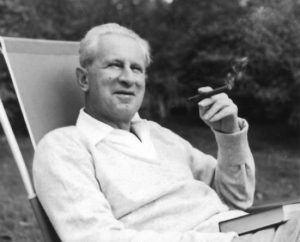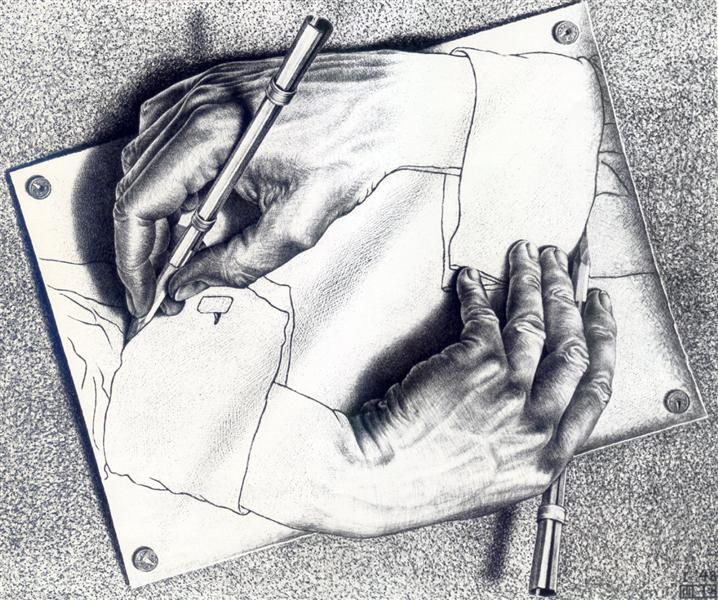This article was originally a paper delivered at the conference “Reclaiming the Unconscious – On The Intersection of Psychoanalysis With the Humanities,” October 21-23, at the University of Denver, Denver, Colorado.
“Our writing tools are also working on our thoughts[1].” So wrote — or more precisely, so typed — Friedrich Nietzsche in 1882.
Nietzsche’s severe myopia, anisocoria, and migraines caused him to abandon hand writing altogether for a marvelous new inscription device which was then making its emergence in Europe: Malling Hensen’s writing ball, a proto-typewriter. From that point forward, it could be said that Nietzsche’s preferred tool of philosophizing was not the hammer but the typewriter. As the media theorist Friedrich Kittler notes, Nietzsche’s post-typewriter publications “changed from arguments to aphorism, from thoughts to puns, from rhetoric to telegram style…Malling Hansen’s writing ball, with its operating difficulties, made Nietzsche into a laconic[2]”.
Indeed, one might describe it as a fervent laconism, for it is only after Nietzsche became acquainted with the writing ball that he produces texts such as The Gay Science, Zarathustra, Beyond Good and Evil, and The Genealogy of Morals.
I must confess to you that I come to you with great fear and trembling this afternoon, for while I am a reader of Lacan, I am certainly no expert in the academic sense of term; nor am I a practitioner, like many of those who are gathered in the room. My prowess, if such a word could be used, is in media and technological theory. But as many academics and analysts have noted, there are deep and rich affinities between the structures of our technological media and the structures of our unconscious, one that this paper will explore ever so briefly.
And since the illuminating purpose of this conference is to strategize theories of emancipating the unconscious, my purpose here is first to err on the side of description (and perhaps leave the prescription to the Lacanians) and second to discuss the complex, interconnected, and constantly operative technological networks that not only illuminate the symbolic order we find ourselves thrust into but that produce the “little others” that underwrite its identitarian force.
In other words, while it is certainly fun and fascinating to discuss the effect of my iPhone on my unconscious, I prefer instead to consider the technological ensemble in which an iPhone mediates the imaginary, the symbolic, and the real, and is one mere object reinforcing what some have called the “soft totalitarianism” engendered by modernity’s master discourse: technology. If emancipation is to occur within this matrix, it must look bravely into its abyss.
Herbert Marcuse
The twentieth century was rife for theories surrounding our technological instruments, our media, and how they mold the thoughts of the masses. Herbert Marcuse was among the first writers to tackle the issue via a synthesis of Marxist cultural critique updated for the 1960s and Freudian psychoanalysis. His writings revealed widespread, systemic practices of technological oppression. As he put it, ours is increasingly a “one-dimensional society”, a culture that celebrates the triumph of positivistic, scientific thinking, the eradication of negative elements from which social change might find the strength to pivot, and the repression of any behavior, values, or aspirations that do not

conform to the dominant regime of rationality.
Furthermore, Marcuse noted how the meaning of freedom, a concept which is central to liberal humanist discourse, has shifted from denoting qualitative human autonomy and self-determination to a quantitative range of choices among different commodities. We express our freedom through choosing from a wide variety of commodities and services while failing to realize that, in the end, they are all essentially the same thing. So no matter whether we are selecting breakfast food, automobiles, or candidates for public office, freedom is conceived along techno-capitalist lines of commodification[3].
This demonstrates what Marcuse called “surplus repression”, which is a unique feature of repression existing in a world mediated by modern technologies. Where Freud first postulated the reality principle, to which individuals living in any society must adjust through repression, Marcuse suggested a “performance principle” that generates surplus repression. In his view, excess production, persistent competition, and overwhelming amounts of consumption are made possible through the deep harmonization between modern technological and economic structures.
Within these structures, so-called “needs” take on a life of their own and are pursued for their own sake independently of the basic needs of the individual. We ‘need’ the new iPhone despite the functionality of the device we current own. More extreme forms of repression are required to satisfy these additional needs as they are dictated by the performance principle. As Jere Surber suggests, we can catch sight of surplus repression as it is generated by the performance principle in figures such as the workaholic or the shopaholic, both of whom are the unconscious productions of one-dimensional society[4].
Today, we might consider the uninterrupted social media mouthpiece in this light, who is persistently enlightening us with his status updates (it is usually a male, after all…), or those whose presence must be bathed in the glow of 24-hour cable news media. In Marcuse’s mind, the neuroses witnessed by Freud, such as alienation, anomie, and aggression, were merely symptoms of the surplus repression demanded by “advanced, expansionist economies and enforced by their ever more extreme structures of social domination[5].”
Marcuse’s insight into the stochastic nature of these symptoms is essential to the conversations happening here over the next few days, for if the configuration and texture of repression and the symptoms it generates are distributed along the changing lines of society, then we must attune ourselves today to the technologically-enabled nature of those societal shifts.
Gilles Deleuze
This is where Deleuze’s insight into the nature of “control societies” might help better clarify the stakes of our current situation. According to Deleuze, we must pay attention to the changing social configurations that have been wrought about by the transition from disciplinary societies to control societies.
As Foucault so clearly illuminated, disciplinary societies operated via a logic of confinement, whereby one circulated among differentiated sites that generated a particular organizational rationality. They were independent variables that contained a common language: “the factory is not the home”, for example; one could not easily confuse the two. These sites provided space and place, organized time, and functioned as “forces of production” or locales that brought together discrete individuals and transformed them into a common mass for the sake of production.
Deleuze wrote that these disciplinary spaces — the prison, the factory, the home, the family, the school — are breaking down in the digital age and transforming into spaces of control. Because we are living under the conditions initiated by the digital revolution and neoliberal economics, we have become seemingly freed from the disciplinary monotony of waking in our homes, commuting to our jobs, fetching the kids from school, eating dinner at home, and repeating it again tomorrow.
But whereas sites of confinement were distinct molds, controls are concerned with modulations and undulations. As an example, consider the factory (a disciplinary space) as it contrasts with the business (a space of control). Factories gathered a body of workers and found equilibrium in producing the highest amount possible while keeping wages at their lowest possible point.

Businesses, on the other hand, are shape-shifting like a gas: they encourage individual rivalry through sales competitions, challenges, and seminars; one’s salary modulates according to met or missed quotas, shifting sales territories, or one’s level of education. And as it concerns education, Deleuze wrote how school, once a terminal process, has transformed into “continuing education” and “continuing assessment”.
Deleuze concludes that you never quite finish anything in control societies: business, training, and military service have become “coexisting metastable states of a single modulation, a sort of universal transmutation” in a networked, globalized world[6]”. Furthermore, as it concerned individuals and masses, disciplinary societies possessed “two poles”: signatures could stand in for individuals and numbers represented one’s position in a mass. These disappear in control societies, where numerical codes are passwords that stand-in for the individual and data sets numerate and organize the masses.
As Deleuze wrote, “The digital language of control is made up of codes indicating whether access to some information should be allowed or denied. We’re no longer dealing with a duality of mass and individual. Individuals (have) become ‘dividuals,’ and masses (have) become samples, data, markets, or ‘banks[7]’”. For Deleuze, the modern capitalist means of production and our expansive technological networks have created a master discourse that abstracts individuals from databanks, slices them up into ‘dividuated’ identities that are persistently modulating though their interconnected networks, and requires them to create personalized passcodes by which they gain access to information necessary to their being, such as bank statements, email, social networks, and credit scores.
Furthermore, these undulations are increasingly mediated though electronic screens and mobile-based technological platforms. There is thus an uncanny superimposition between the so-called “virtual” realities and offline or “real” realities, a melting together of the symbolic, the imaginary, and the real between which it becomes increasingly difficult to differentiate.
One wonderful example of this comes from the programmer/journalist Paul Miller and his viral 2013 article entitled, “I’m Still Here: Back Online After a Year Without the Internet[8]”. The gist of Miller’s article is this: after taking a one-year Sabbatical from the internet to “reprogram (his) relationships, emotions, and sensitivities”, Miller discovered a rather startling fact: where he anticipated he might find his “real” self and become more engaged with the world around him, instead he realized the internet is where people are. As he wrote, “My plan was to leave the internet and therefore find the ‘real’ Paul and get in touch with the ‘real’ world, but the real Paul and the real world are already inextricably linked to the internet.
Not to say that my life wasn’t different without the internet, just that it wasn’t real life.” With time ticking down to his inevitable online homecoming, Miller concluded his article on the following note: “When I return to the internet, I might not use it well. I might waste time, or get distracted, or click on all the wrong links. I won’t have as much time to read or introspect or write the great American sci-fi novel. But at least I’ll be connected” (italics mine). Miller’s story further demonstrates the nature of debt as a mechanism in control societies, a concept discussed by Deleuze, Kittler, and more contemporarily by theorists such as Maurizo Lazzarato. Subjects are indebted to and persistently decentered by this technological symbolic order, which demands our allegiance whether we know it or not.
Jacques Lacan
Now I could probably go on for hours discussing media theories of particular technologies such as film, digital signal processors, and mobile internet platforms, but I’ll spare you such an endeavor because I trust that your Lacanian theoretical and pragmatic censors are already ablaze. To attempt a synthesis here, the subject of Lacanian psychoanalysis and contemporary media theory are multivalent, dynamic, and de-centered. Furthermore, this subject is immersed in a techno-centric symbolic order that is constantly reconfiguring its signifiers in relation to its signifieds, such that unconscious desires and motivations are persistently renewed in conscious discourse.
This Big Other provides a place and a code for the subject without him being aware of its organizational operations. And as Lacan notes, it repeatedly hides itself in its totality as the subject proceeds unawares from signifier to signifier. Again, consider Miller, for whom the internet was real life, “where the people are”; or Nietzsche’s writing ball, which “worked on his thoughts” in an age of increasing machination. As Deleuze points out, the structures of techno-capitalism create a human who “is no longer a man confined but a man in debt[9].”
We are indebted to the idealized images of the imaginary plane, such as the higher salary permitted by the master’s degree, or the honor bestowed after successfully winning the sales competition, or the most ‘likes’ generated by that witty Facebook post, but in an ambivalent way, for the ego is persistently decentered by the lack of the objects of its identification[10].
At this point, resistance appears futile. But as Kittler noted, Lacan’s theory was always up to date with contemporary technological developments. As he wrote, “(in Lacan) the symbolic of letters and numbers, once celebrated as the highest creation of authors or geniuses (are now) a world of computing machines. The real in its random series, once the subject of philosophical statements or even ‘knowledge’ (are now) an impossibility that only signal processors and psychoanalysts of the future can bring under control. Finally, the imaginary, once the dream produced by and coming out of the caverns of the soul (are now) a simple optical trick (produced by film making[11]).”
to date with contemporary technological developments. As he wrote, “(in Lacan) the symbolic of letters and numbers, once celebrated as the highest creation of authors or geniuses (are now) a world of computing machines. The real in its random series, once the subject of philosophical statements or even ‘knowledge’ (are now) an impossibility that only signal processors and psychoanalysts of the future can bring under control. Finally, the imaginary, once the dream produced by and coming out of the caverns of the soul (are now) a simple optical trick (produced by film making[11]).”
Lacan himself spoke of the impact that our technological structures exert upon the unconscious. As he wrote, “You are infinitely more than you can imagine, subjects of gadgets and instruments of all kinds — ranging from the microscope to radio and television — that will become elements of your being[12].” In this way, Lacanian psychoanalysis might possess a key to breaking the encrypted codes of our modern technological culture, to what we might legitimately call a semiotic hacking of the subject, for as Kittler so rightly put it, “Lacan was the first (and last) writer whose book titles only described positions in the media system.
The writings were called Writings, the seminars, Seminar, the radio interview, Radiophone, and the TV broadcast, Télévision[13].” In Lacan’s absence, the task falls upon us to theorize in the mediatic position of the digital. It remains to be seen whether emancipation is a real possibility within this technological constellation or if, in the foreboding words of Rousseau, we are resigned to “hanging garlands of flowers on on the chains that bind us”.
Jeffrey Appel is a doctoral student in the joint program of the University of Denver and Iliff School of Theology and an assistant editor of the Journal for Cultural and Religious Theory.
_____________________________________________________________
[1] Friedrich Kittler, Gramophone, Film, Typewriter (Stanford CA: Stanford University Press, 1999), 200.
[2] Ibid.
[3] See Jere Surber, Culture and Critique (Boulder CO: Westview Press, 1997), 148.
[4] Ibid.
[5] Ibid., 146.
[6] Gilles Deleuze, Negotiations 1972-1990 (New York: Columbia University Press, 1197)179.
[7] Ibid., 180.
[8] http://www.theverge.com/2013/5/1/4279674/im-still-here-back-online-after-a-year-without-the-internet
[9] Deleuze, 181.
[10] See Surber, 197.
[11] Kittler, 168.
[12] Quoted in Kittler, Gramophone, 170.
[13] Ibid., 170.


